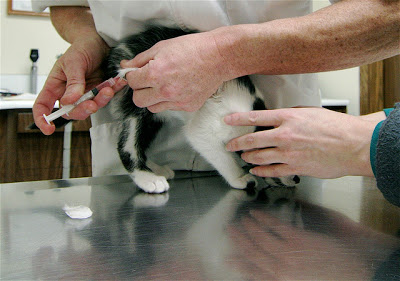Dogs
by Dr. Julie Buzby
The idea of dogs going to the vet for their “annual shots” just because one year has transpired, is as outdated as the idea that the earth is flat. There is overwhelming scientific evidence that dogs should be vaccinated based on their individual risk factors. These include age, breed, lifestyle, and environmental exposure.
 Dr. Julie Buzby is a homeschooling mom of seven, American Veterinary Chiropractic Association and International Veterinary Acupuncture Society certified holistic veterinarian, and passionate advocate for canine mobility. She can be found at Twitter @DrBuzby and on Facebook.com/ToeGrips. You'll also find more of Dr. Julie's posts at our Ask the Vet Archives page.
Dr. Julie Buzby is a homeschooling mom of seven, American Veterinary Chiropractic Association and International Veterinary Acupuncture Society certified holistic veterinarian, and passionate advocate for canine mobility. She can be found at Twitter @DrBuzby and on Facebook.com/ToeGrips. You'll also find more of Dr. Julie's posts at our Ask the Vet Archives page.
You may also enjoy reading her recent articles:







Dr. Julie's opinion or advice does not replace an actual exam with a veterinarian.
- 10 Tips For Fido's Longest Life
by Dr. Julie Buzby courtesy Dr. BuzbyI’m smitten with my dog Luke. And like most of you, I want my dog to live forever. I dream of growing old with my husband, children and grandchildren, and our beloved rescue mutt. While immortality...
- Puppy Shots Schedule
A mother passes on a significant amount of antibodies to her litter, when she gives birth to them. These antibodies ensure that the puppies are able to combat most diseases, well on their own. But of course, they may not be enough to safeguard your...
- Sedatives For Dogs
A sedative is a class of drug that reduces excitation and agitation. Like humans, dogs too can get excited or nervous in certain circumstances, especially while traveling by air, visiting an unfamiliar place, meeting new people, hearing fireworks,...
- Anti-inflammatory For Dogs
Inflammation occurs as a result of the body's natural response towards irritation or injury. Inflammation is characterized by redness, warmth, swelling and pain. Vets usually prescribe Non-Steroidal Anti-Inflammatory Drugs (NSAIDs) to dogs diagnosed...
- Ibuprofen For Dogs
Ibuprofen is a widely used pain relief medicine mostly advocated for people. Like humans, dogs do suffer from pain and discomfort symptoms that come along with several diseases such as headache, backache, joint pain, arthritis, physical injuries,...
Dogs
Tweaking Your Dog's Vaccinations
by Dr. Julie Buzby
 |
| courtesy Chuckumentary via Flickr.com Annual Vaccinations? Maybe Not! |
Why does it matter?
Vaccines jolt the immune system. This jolt creates an immune response in the body which builds antibodies against an altered, non-infectious bug. These antibodies should be protective if there is exposure to the live version of the germ. However, the jolt that helped create protection can be problematic. Autoimmune diseases, tumors, thyroid disease, and allergic or anaphylactic reactions (shock) are complications that can occur soon after vaccinations, or much later.
• Ask your veterinarian about vaccinating every 3 years for Distemper and Parvo, or titering to avoid re-vaccinating individuals with “protective” titers.
• Discuss your dog’s lifestyle with your vet to design a customized vaccine protocol.
• If your dog has ever had a prior vaccine reaction, make sure your veterinarian is aware of that.
• Vaccinate your adult dog for rabies every 3 years, or the maximum interval allowed by law. All states now have 3 year licenses after the second vaccine is administered, but county and city laws may differ. Check out rabieschallengefund.orgto learn about a grassroots movement seeking to extend the rabies booster interval from 3 to 5 (and then 7) years!
What about drugs? A wise old veterinary professor once quipped, “If a medication doesn’t have side effects, it doesn’t have effects either.” This is true for everything from aspirin to antibiotics. Think about the drug commercials on TV which end with 10 seconds of serious warnings!
• Make sure your veterinarian is aware of all drugs and supplements your dog receives, especially when writing a new prescription. If your dog is on chronic medications, such as thyroid medication or arthritis medication (NSAIDs), periodic bloodwork is recommended to monitor organ systems and/or blood levels of the drug.
• With your veterinarian’s help, work to find the lowest effective pain medication dosage to minimize side effects.
• In some situations, supplements may be used in place of, or along with drugs to allow lower drug dosages.
• In terms of potential for toxicity, drugs fall on a spectrum. Some are much safer than others. Ask your vet to educate you on the common side effects of any medication your dog receives.
• Side effects of drugs can often be counteracted with herbs. An example of this would be using milk thistle along with drugs known to insult the liver.
• Understand that adverse drug reactions many not occur immediately. Sometimes they occur after the dog has been on the drug for years.
I’m convinced that vaccinations and medications are a double-edged sword. Both are an integral part of maintaining health. Both also hold the potential for harm.
Yes, I am opening a can of worms. But I couldn’t write a series on helping our dogs reach their maximum health and longevity potential without touching on these issues. Be informed. Be intentional. Be observant, with the ultimate goal of partnering with your veterinarian in weighing the risks versus benefits of anything you administer to your dog.
You may also enjoy reading her recent articles:
- 10 Tips for Fido's Longest Life
- Leaner Pets Live Longer
- Finicky Eaters







- 10 Tips For Fido's Longest Life
by Dr. Julie Buzby courtesy Dr. BuzbyI’m smitten with my dog Luke. And like most of you, I want my dog to live forever. I dream of growing old with my husband, children and grandchildren, and our beloved rescue mutt. While immortality...
- Puppy Shots Schedule
A mother passes on a significant amount of antibodies to her litter, when she gives birth to them. These antibodies ensure that the puppies are able to combat most diseases, well on their own. But of course, they may not be enough to safeguard your...
- Sedatives For Dogs
A sedative is a class of drug that reduces excitation and agitation. Like humans, dogs too can get excited or nervous in certain circumstances, especially while traveling by air, visiting an unfamiliar place, meeting new people, hearing fireworks,...
- Anti-inflammatory For Dogs
Inflammation occurs as a result of the body's natural response towards irritation or injury. Inflammation is characterized by redness, warmth, swelling and pain. Vets usually prescribe Non-Steroidal Anti-Inflammatory Drugs (NSAIDs) to dogs diagnosed...
- Ibuprofen For Dogs
Ibuprofen is a widely used pain relief medicine mostly advocated for people. Like humans, dogs do suffer from pain and discomfort symptoms that come along with several diseases such as headache, backache, joint pain, arthritis, physical injuries,...
